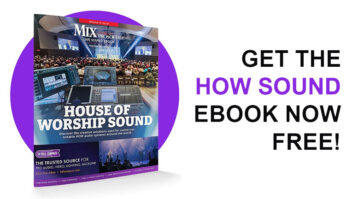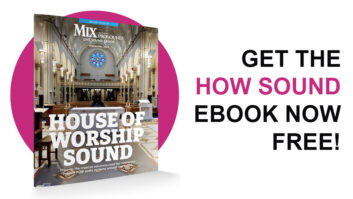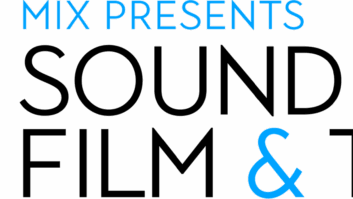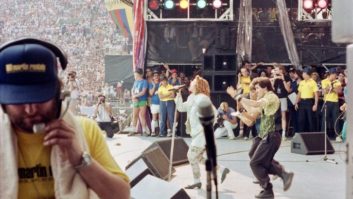
Gareth Davies is an accomplished TV composer who has written scores for a variety of TV programs, from NBC’s Saturday Night Live to CBBC’s animated children’s show Scream Street. He plays cello and piano and has a degree in music technology from Kingston University, deciding at age 38 to put these skills into practice with his multifaceted audio production company, The Sound Boutique. The Sound Boutique creates and sources high-quality sound effects, provides voiceover, creates custom audio IDs and soundtracks and broadcast-quality branded content. Here, Davies tells us more about The Sound Boutique and provides insightful tips about composing for TV.
Tell us about The Sound Boutique.
The Sound Boutique is a multi-purpose company, channeling my work in sound. The website (www.thesoundboutique.com) is the easiest way to understand what I do. My composing work features, and I point potential clients toward my composer page, where they can see and hear work examples; I have completed audio branding work and there are examples on that page; I also offer real-world sounds. Most recently I have created an audio brand called “screenless,” which offers original audio content for both kids and grownups.
What inspired you to launch it?
I’m fascinated not only by music but by sound in general. When I was thinking of setting up a company in 2011, I wanted to keep my options open as I had no real work experience in the TV and music industries. I started The Sound Boutique as a vehicle for whatever I wanted to pursue; as long as it is related to sound, I’m interested.
What is your background?
I grew up obsessed with music, spending a lot of time in youth orchestras (my main instruments growing up were the cello and piano), and later on writing for and playing in rock bands on various instruments over the years. I did a degree in music [technology] at Kingston Uni, and afterwards a PGCE in music [secondary]. Changing direction, I then moved to London and worked as anything I could to put food on the table, ending up as an in-house designer for a recruitment firm, for everything from business proposals to websites. In 2005 I became a primary school teacher for six years before, at the age of 38, taking a leap of faith and setting up The Sound Boutique. I’m happy to declare that there will be no more career changes for me, thank you very much.
You compose a lot for TV. What would you advise for those wishing to compose for TV themselves?
This is a difficult question to answer, as even in the last eight years the landscape has changed somewhat. One of the best pieces of advice for me at the start came from a composer called Tom Linden (we share the same accountant), who kindly agreed to spend an hour with me. He told me to keep writing, even if there’s nothing to write for. It’ll not only build your portfolio but also improve your skills in writing and production.
The next bit of advice is to not do anything for free. I don’t necessarily mean demand money, but do get something out of work being offered. You might be offered a short film for exposure; well, what can they do for you in return if they don’t have the cash? There should always be an exchange. Look to join the PRS so you can collect royalties (they also have rate cards for charging), and try to find some contract templates (PACT are good) to read up on what a good contract looks like.
Next: don’t be a stranger. Reach out to fellow composers and mingle. They will be your support group for those moments when you can’t get your computer to work, and also when you want to share your good news. If you don’t know where to start, SCOREcast is a Facebook group with thousands of members all over the world. Also reach out to producers, directors, anyone you can start a dialogue with.

Nowadays I would also say diversify; learn more than one skill. With streaming, the royalties you receive are much lower than terrestrial, and with threats of broadcasters taking away royalties altogether, there’s the possibility that it won’t be possible to make a living from composing alone. I produce a podcast called Making a Soundtrack that would be worth a listen to hear more about this. It’s a subject our guests bring up a lot.
What are your must-have skills?
This might sound obvious, but you have to recognize what you are writing for. Writing for drama (a diverse landscape in itself) is very different to writing or animation, for instance. Do listen to soundtracks but only while watching what they are attached to, so you can learn about how different themes fit in to what you are looking at.
On the production side, keep learning. If you have a day when you a less inspired to write, search online for tips and tricks for your DAW, or how best to mic a cello. Never stop learning.
On the personal side, be open. Listen more than talk. If you receive notes that you don’t agree with for something, remember that you are helping to tell someone else’s story.
What has been your favorite project to work on?
On the composing side, CBBC’s Scream Street has been wonderful. After my first meeting about it I read Tommy Donbavand’s first book from cover to cover on the train home. I knew then that I had to do it. I am so in awe of how the stop-motion animators not only make characters move but give them the personalities that are written in the script. It continues to blow my mind.
How do your methods differ for different projects? For example, animated vs. reality tv, docs, etc.
I approach everything I do with a blank slate. I read the brief and sit down with the relevant people and try to glean any preferences. Even within the “animated” genre, it could mean pretty much anything musically, so I try to ignore any preconceptions I might have about certain styles.
In a very general sense, you can exaggerate a lot more in animation, depending on what is required. In documentaries I think the key is to capture the mood and not take over, so there’s more scope for creating drones and atmospheres out of real world sounds.
Tell us more about your “real-world sounds.”
I’ve spent a long time gathering sounds around me to use in my work, using my trusty little Tascam handheld recorder. A couple of years ago I thought it would be nice to arrange what I had into themed sound packs. A lot of sound packs you can find online are enormous and expensive; so I thought smaller, more inexpensive packs might help people looking for specific sounds.
What projects are you working on at the moment?
I have spent the last few months producing a podcast called Making a Soundtrack, the beauty of which is that my co-producer Dan and I are also making an album. We’ve had a wonderful response, especially from the composer and post-production community, and had a variety of amazing guests who do all sorts of things in the TV drama production industry.
I have also been developing an audio series for kids with an illustrator friend Richard Smith, called Have You Ever Seen. We are being really careful to get it right, and it makes me smile every time I look at my to do list. Oh, so I can now add writer of silly rhymes to my CV.
What are your plans for The Sound Boutique in 2020?
I’m about to score the second season of Scream Street, which I’m really looking forward to. We are also planning for Making a Soundtrack series 2, and deciding the roadmap for Have You Ever Seen. I’m always open to new ideas and conversations, so if you want to get in touch you can via the website or on social media.
The Sound Boutique • www.thesoundboutique.com
This story originally appeared in Pro Sound News sister publication Pro Sound News Europe.







